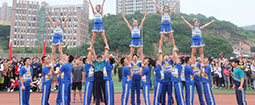1. Location and transportation
Fuzhou University of International Studies and Trade is located in Fuzhou City, provincial capital of Fujian Province. It is about 23 kilometers away from Fuzhou Changle International Airport, 21 kilometers from South Railway Station of Fuzhou, and only 5 kilometers from the nearest entrance to highways. What’ more, it is only 4 kilometers from the nearest city center where you can find kinds of shopping centers, the Wal-Mart, theaters, KTV, etc..
2. An overview of Fujian and Fuzhou
Lying in the southeast coast of China, Fujian is facing Taiwan Island across the straits, connecting jointly northward with Zhejiang Province and southwards with Guangdong Province. The total population of Fujian reached about 37,480,000. It covers a land area of 124,000 square kilometers and its coastline extends to 3,752 kilometers, ranking second in China. Fujian has a sub-tropical maritime climate influenced by East Asian Monsoon, so it receives sufficient bright sunshine and abundant rainfalls and the forests cover rate ranks top in China.
As a mountainous coastland province, Fujian enjoys both tradition culture of China and its unique sea culture and boasts many famous cultural and natural heritages and brands. There is Wuyi Mount, a world cultural and natural heritage; Tulou Cluster -- a world cultural heritage in southern Fujian, Taining -- both a world natural heritage and a world geological park, and other three world geological parks -- Baishuiyang, Taimu Mount, and Baiyun Mount. Also, its capital city Fuzhou is called “a capital of hot spring”; the beautiful coastland city Xiamen (Amoy) is “a garden in the sea”; the Meizhou Island is regarded as the holy land of Mazu (Peace Goddess of Sea); and Pingtan Island is dubbed as “the Qilin of East China Sea”(Qilin is a legend animal represents power and prosperity). Fujian is also the home to the famous Wuyi black tea and Dehua porcelain, and Fujian cuisine is one of the eight regional cuisines in China. The famous cuisines such as Fotiaoqiang (Steamed Abalone with Shark’s Fin and Fish Maw in Broth) and Braised Sea Clam in Chicken are in the list of the state banquet.
Fuzhou is one of the most important sea ports in southeast China and the door to Maritime Silk Road. As one of the significant economic and cultural centers in China, it is ranked No. 7 in the list of “most developmental sustainable cities” in China, a document co-published by McKinsey & Co., Columbia University and Tsinghua University in 2003, ranking after Hangzhou and Guangzhou and before Beijing.
Facing the East China Sea, Fuzhou has a mild climate and is surrounded by mountains and rivers, attracting different ethnics to habitat which makes here a multi-cultural place with beautiful landscape and peaceful environment. The coverage of forests in Fuzhou reached 54.9% and the air purification level hits 96.7%, ranking top 10 capital cities in China. It is considered as a favorable place to habitat not only because of its good environment but the transportation convenience. Fuzhou Port is one of the 25 major ports in China, and has the trial direct flight to Taiwan. Fuzhou Changle International Airport is one of the main airports and an air-hub in the southeast China, having over 70 domestic and international airlines. Fuzhou Station is one of the ten major railway hubs in China, playing a key role in China’s coastland railway system, having direct high-speed trains to Beijing, Shanghai, and Guangzhou etc.
Fuzhou is a city of over 2,200 years, and the “three mountains, two pagodas and one street” city landscape in Marco Polo’s description still remains today. In early 15th century, a fleet of the Ming Imperial navy under Admiral Zhenghe sailed from Fuzhou to the Indian Ocean. The main boat of the fleet was made in Fuzhou. In 15th - 19th century, Fuzhou served as a hub for people to transfer and travel to the Ryukyu (Okinawa). In 1844, Fuzhou becomes one of the five Chinese treaty ports. Since the British set up its consulate in Fuzhou in 1845, there have been 17 countries setting up their consulates here in history. Also, Fuzhou is the cradle of modern Chinese navy and the birthplace of Chinese shipyard culture. Now, Fuzhou has 18 important heritage sites under state protection such as Hualin Temple (built in 964, Song dynasty), the oldest surviving wooden building in south China, the Three Lanes and Seven Alleys, the biggest ancient complex in city centers of China and the Honglin Cuo in Minqing, the largest monomer ancient dwelling in China.
As the culture and education center of Fujian, Fuzhou is also famous for the Min opera, or known as Fuzhou drama, an intangible cultural heritage, and famous for the Shoushan Stone, which is regarded as national stone. There are many great buildings for culture and sports such as Fujian Provincial Museum, Fuzhou Theater, Haixia Olympic Center and so on. There are 32 higher education schools in Fuzhou, including 19,500 post graduates, 318,300 undergraduates and 19,200 full-time teachers for higher education.
Now, Fuzhou is the only capital city in China that has both National New District, Free Trade Experimental Zone, and the core district of Maritime Silk Road and Demonstration Area of Cross-straits Economic Cooperation. With favorable policies, Fuzhou attracted many business platforms such as China-ASEAN Seafood Exchange, Cross-border E-commerce Center, Bonded Port Area, Tax-protection Logistics Park, Export Processing Zone, Finished Automobile Import Port and so on, forming an industry system with mechanized equipment, food, textile and petrifaction as its main industries, and focuses on the development of transportation and communication, business cooperation and humanity communication. In 2014, there were about 1,555,000 permanent residents in downtown Fuzhou, and its GDP hit 104.14 billion yuan, industry total output value amounted to 237.59 billion yuan, and its general fiscal budget reached 17.13 billion yuan.

